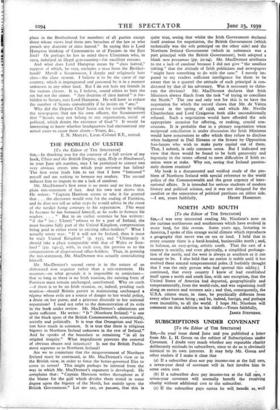THEOLOGY FOR BOY SCOUTS [To the Editor of THE SPECTATOR]
Sm,—Lord Hampton's official reply to my letter fails to meet either of my points. I asked whether men who conceive of God as metaphysical, not personal, are forbidden to become Scouts. Lord Hampton says that the Scout Movement " cannot afford to define God." Very true and very wise. But why in his next sentence does he state that those persons exclude them- selves from the Scout Brotherhood " who profess to deny or act in such a manner as to ignore the acceptance of God "? This is indeed a dark saying, which would alike puzzle a tender- foot, a Scoutmaster and a Judge of the High Court. The last- named would presumably ask for a definition of God. Matthew Arnold defined God as " The Eternal Power, not ourselves, which makes for righteousness." Is this acceptable to Lord Hampton? Is the pantheist excluded? The Buddhist, we know, may become a Scout, though his religion has no place for God. Can Lord Hampton instance a clear case, actual or imaginary, where an Englishman who wished to become a Scout would be refused enrolment on this head?
Lord Hampton is equally obscure regarding the eligibility of Communists. My question was perfectly explicit—viz., may a Communist be a Scout? Surely it ought to be possible to reply " Yes " or " No." The only allusion to the point in Lord Hampton's letter is contained in the words, " There is a place in the Brotherhood for members of all parties except those whose views lead them into breaches of the law or who preach any doctrine of class hatred." In saying this is Lord Hampton thinking of Communists or of Fascists in the East End? Or perhaps he has in mind tho'ie Ulstermen who, in 1914, indulged in illegal gun-running—for excellent reasons.
And what does Lord Hampton mean by " class hatred," support of which, he says, excludes a man from the Brother- hood? Myself a Scoutmaster, I deeply and religiously hate class—the class system. I believe it to be the curse of our country, which is impregnated and poisoned by it in a manner unknown in any other land. But I do not hate my friends in the various classes. It is, I believe, sound ethics to hate the sin but not the sinner. " Any doctrine of class hatred " is for- bidden to Scouts, says Lord Hampton. He will have to reduce the number of Scouts considerably if he insists on " any."
Why did the Deputy Chief Scout ask for trouble by telling the newspapers (but not his own officers, the Scoutmasters) that " Scouts may not belong to any organisation, social or political, which denies the existence of God "? It would be interesting to know whether headquarters had encountered any actual cases to cause them alarm.—Yours, &c.,
E. N. MOZLEY, Lieut.-Colonel R.E., retired.











































 Previous page
Previous page